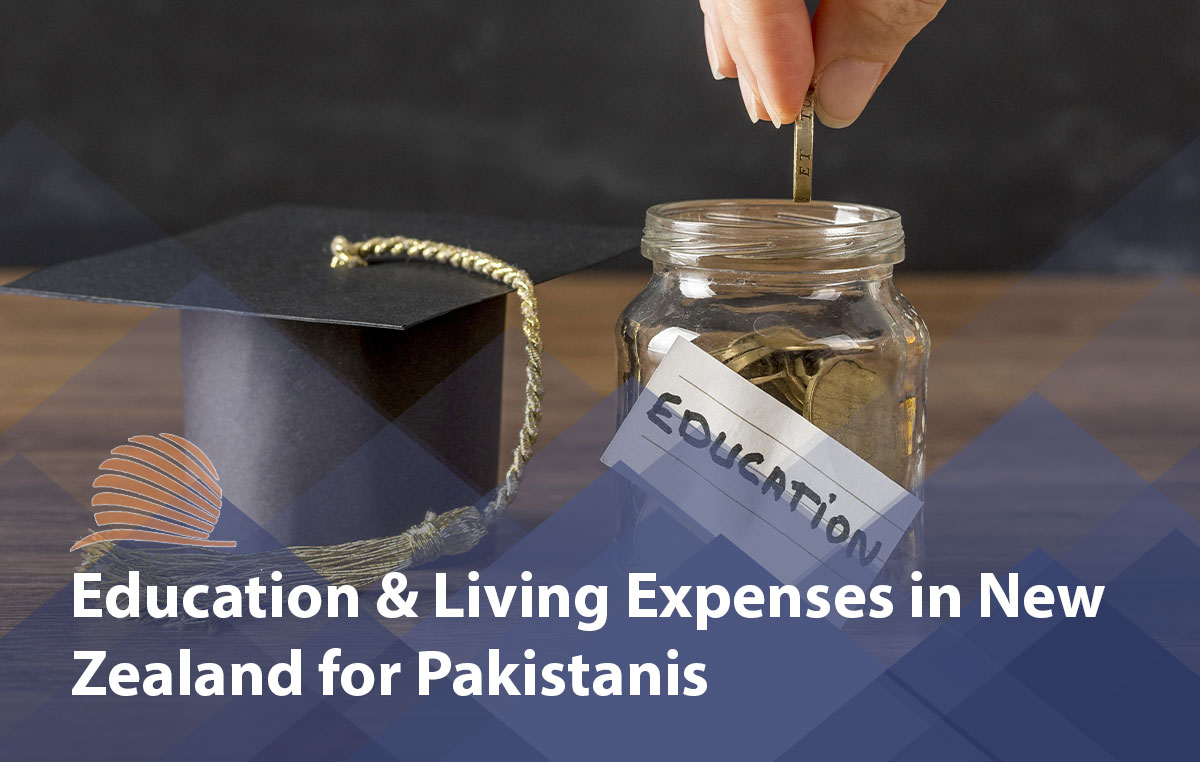Why Pakistani Students Choose New Zealand As Study Destination

Study abroad expert advice
Don't waste time! just fill the form to get help.
Cost of Studying in New Zealand for Pakistani Students
New Zealand offers world-class education, but before planning your study abroad journey, it’s important to understand the costs involved. From tuition fees to accommodation and daily living, managing your budget is a key part of student life. This guide provides a complete breakdown of the study and living expenses for Pakistani students in New Zealand.
1. Tuition Fees in New Zealand
The largest expense for Pakistani students is tuition fees. The amount depends on the level of study, university, and course.
Level of Study | Average Annual Fees (NZD) | Approx. in PKR (1 NZD ˜ 185 PKR) |
Undergraduate Degree | 22,000 – 32,000 | 4.0 – 5.9 million PKR |
Postgraduate Degree | 26,000 – 37,000 | 4.8 – 6.8 million PKR |
PhD (International) | 7,000 – 12,000 | 1.3 – 2.2 million PKR |
English Language Courses | 350 – 500 per week | 65,000 – 92,000 PKR |
Tip for Pakistani Students: PhD programs in New Zealand are highly affordable compared to other countries, as international students often pay the same fees as domestic students.
2. Accommodation Costs
Housing is another major expense, and costs vary depending on city and living preferences.
Type of Accommodation | Monthly Cost (NZD) | Approx. in PKR |
On-Campus Hostel | 700 – 1,200 | 130,000 – 220,000 |
Shared Apartment | 600 – 1,000 | 111,000 – 185,000 |
Homestay with Local Family | 900 – 1,300 | 166,000 – 240,000 |
Private Apartment | 1,200 – 1,800 | 220,000 – 333,000 |
Students often choose shared housing to reduce costs.
3. Food and Daily Living Expenses
Grocery shopping and dining out in New Zealand are relatively affordable if you manage your budget wisely.
- Groceries: NZD 80 – 150 per week (˜ 15,000 – 28,000 PKR)
- Eating out (casual meal): NZD 12 – 20 (˜ 2,200 – 3,700 PKR)
- Monthly food expenses: NZD 400 – 600 (˜ 74,000 – 111,000 PKR)
Cooking at home helps Pakistani students save a significant amount compared to frequent dining out.
4. Transportation Costs
Most students use public transportation or bicycles for daily travel.
Mode of Transport | Monthly Cost (NZD) | Approx. in PKR |
Public Bus/Train | 120 – 180 | 22,000 – 33,000 |
Bicycle (one-time cost) | 150 – 300 | 28,000 – 55,000 |
Car (purchase & fuel) | 4,000+ (one-time) | 740,000+ PKR |
Many cities also offer student discounts on bus/train passes.
5. Health Insurance Costs
- All international students in New Zealand must have health and travel insurance.
- Average annual insurance: NZD 500 – 700 (˜ 92,000 – 129,000 PKR)
6. Miscellaneous & Leisure Expenses
Students also need to budget for personal needs, entertainment, and other costs.
- Internet & Mobile: NZD 60 – 100/month (˜ 11,000 – 18,500 PKR)
- Books & Stationery: NZD 500 – 1,000/year (˜ 92,000 – 185,000 PKR)
- Gym/Leisure activities: NZD 40 – 70/month (˜ 7,400 – 13,000 PKR)
7. Total Estimated Annual Expenses
Here’s a rough estimate of the overall yearly cost for a Pakistani student in New Zealand:
Expense Category | Annual Cost (NZD) | Approx. in PKR |
Tuition Fees | 22,000 – 37,000 | 4.0 – 6.8 million |
Accommodation | 8,000 – 15,000 | 1.4 – 2.7 million |
Food & Living | 5,000 – 7,000 | 0.9 – 1.3 million |
Transportation | 1,500 – 2,000 | 280,000 – 370,000 |
Health Insurance | 500 – 700 | 92,000 – 129,000 |
Miscellaneous | 1,000 – 2,000 | 185,000 – 370,000 |
Total | 38,000 – 63,000 | 7.0 – 11.7 million PKR |
Scholarships and Financial Aid
The good news is that New Zealand universities offer scholarships for Pakistani students to help manage expenses. These include:
- New Zealand Commonwealth Scholarships
- New Zealand Excellence Awards (NZEA)
- University-specific merit scholarships
Scholarships can cover part or full tuition, and sometimes living expenses.
Conclusion
Studying in New Zealand can be a life-changing experience, but careful financial planning is essential for Pakistani students. On average, you will need between NZD 38,000 to 63,000 (PKR 7–11 million) annually, depending on your lifestyle and university choice. Exploring scholarships, part-time work, and shared housing can significantly reduce costs and make your education more affordable.














